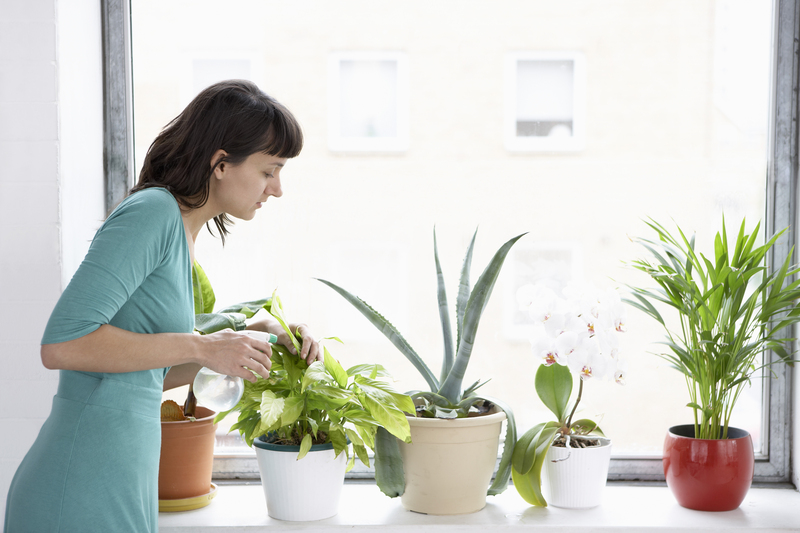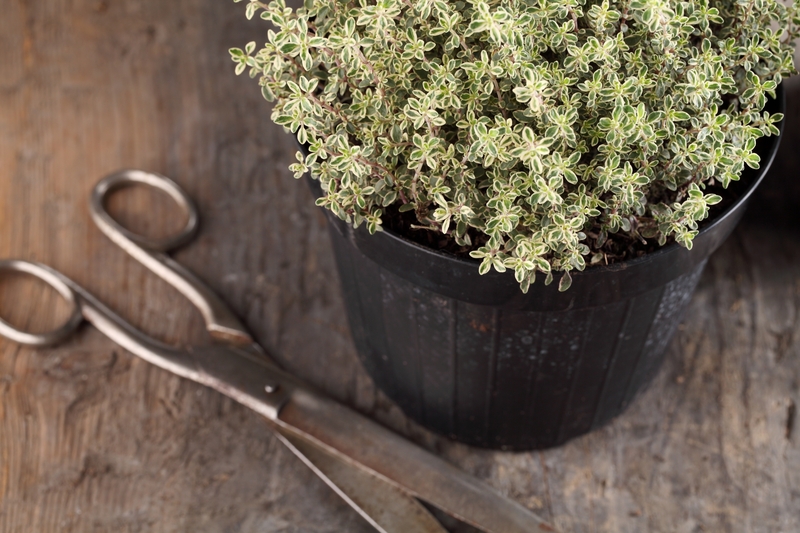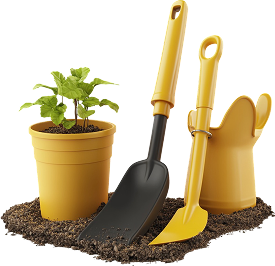Winter Wellness for Your Vibrant Garden Plants
Is your gorgeous garden looking a little weary as the temperature drops? Winter wellness for your vibrant garden plants is essential to help them survive and even thrive during the coldest months. While winter brings dormancy and rest for many species, your garden needn't lose its lustre or health. By adopting a comprehensive approach to winter garden plant care, you can protect your green spaces and prepare for a flourishing spring comeback.
Understanding the Challenges of Winter for Garden Plants
When winter arrives, your garden plants face a unique set of challenges. Frost, freezing temperatures, biting winds, and reduced sunlight all threaten the vitality of even the hardiest species. Inactivity above ground can hide ongoing root development, and fluctuating temperatures may cause damaging freeze-thaw cycles. Providing optimal winter plant care is not just about survival--it's an investment in a garden that's healthy, vibrant and ready to flourish come spring.
How Winter Affects Garden Plants
- Freezing Temperatures: These can rupture plant cells, leading to damage and dieback.
- Frost: Surface frost can attack leaves, stems, and even roots in unprotected soil.
- Dehydration: Dry winds and frozen ground make it difficult for plants to access water.
- Sunlight Deprivation: Shorter days mean less energy for evergreens and winter bloomers.
- Pests & Diseases: Some pests stay active and fungal infections can thrive in damp conditions.

Essential Steps for Winter Wellness for Vibrant Garden Plants
Let's explore tried-and-true strategies for winter garden wellness to keep your plants healthy and poised for spring growth.
1. Assess and Prepare Your Garden in Late Autumn
A season of winter plant health starts before the first frost appears. Take stock of your garden, tidy up debris, and prune dead or diseased branches from shrubs, roses, and perennials. Use sterilized pruners to avoid spreading pathogens. Remove annuals and compost or discard them, ensuring no infected material is left to harbor pests.
- Clean garden beds, clearing away leaves and spent stems.
- Prune judiciously: Focus on dead and damaged wood; avoid heavy pruning on spring-flowering plants.
- Divide and transplant perennials ideal for movement while they're dormant.
2. Mulching for Winter Plant Protection
Mulching is a cornerstone of winter wellness for your vibrant garden plants. Mulch insulates roots, mitigates soil temperature swing, and prevents weed growth. Organic mulches, such as shredded bark, straw, or compost, break down to feed the soil.
Top Mulching Tips:- Apply a 2-4 inch layer after the ground has begun to freeze to trap cold temperatures and prevent early thawing.
- Keep mulch a few inches away from plant crowns and tree trunks to prevent rot and rodent nests.
- Refresh mulch in early spring, integrating well-rotted material into the soil.
3. Watering Strategies for Plant Wellness During Winter
It's an easy mistake to think plants don't need water in winter. However, evergreens and recently planted trees and shrubs can still suffer from dehydration. When the soil isn't frozen, give your garden a deep soak during dry spells.
- Water early in the day so roots absorb moisture before freezing overnight.
- Focus on roots, avoiding wetting leaves to minimize disease.
- Avoid watering during hard freezes, as this can cause root damage.
4. Protecting Tender and Tropical Plants
Certain beloved garden favorites, such as dahlias, cannas, citrus, and potted exotics, need extra help through the winter months. For plants left outdoors, wrap stems with burlap, fleece, or specialized frost cloth. Alternatively, lift tubers, bulbs, or container-grown plants and overwinter them indoors in a cool, dry spot.
- Group containers together against a sheltered wall for additional warmth.
- Bubble wrap or burlap pots to protect roots from freezing.
- Use cloches, cold frames, or mini poly tunnels for added protection of young or tender plants.
5. Lawn and Soil Care in Winter
Achieving winter wellness for your garden plants also means tending to the beds they grow in. Before freezing sets in, aerate compacted soil, add compost, and test pH to correct imbalances. A well-prepared soil base maximizes plant health during the dormant season.
- Feed your soil with aged manure or leaf mold to enrich it during winter slow-down.
- Avoid walking on frosted or wet lawns, which can compact the soil and damage grass blades.
6. Defending Against Winter Pests and Disease
Many believe pests and diseases take a break during the winter, but certain insects and pathogenic fungi remain active or overwinter in debris. Maintain cleanliness and consider organic barriers or winter-appropriate insecticidal sprays only as needed.
- Remove fallen leaves, fruits, and affected twigs where pathogens hide.
- Inspect evergreen leaves for scale, aphids, or late fungal spotting.
- Install protective collars on young trees to guard against rodents.
Choosing Robust Winter Plant Varieties
One of the simplest long-term solutions for easy winter garden plant care is to cultivate species naturally suited to your region's winter. Many winter-hardy ornamentals, evergreens, and perennials are bred for resilience.
- Conifers like spruce, pine, and juniper add four-season structure and color.
- Winter interest shrubs such as witch hazel, winterberry holly, and viburnum produce vibrant stems or berries.
- Hardy perennials like hellebores, snowdrops, and ornamental grasses offer blooms or texture through cold weather.
- Deciduous trees with striking bark or silhouette, like paperbark maple or birch, add architectural beauty.
Planning Ahead: Fall Planting for Winter Success
Fall is the perfect time to plant certain bulbs and perennials, allowing them to establish roots before winter sets in. Consider naturalizing areas with daffodils, tulips, and crocuses; these burst into early spring color, rewarding your winter protection efforts.
Winterizing Garden Structures and Tools
Healthy plants rely on the support of well-maintained gardening infrastructure. Store tools, hoses, and decorative items away from ice and snow. Clean and sharpen tools before storing them dry to prevent rust or disease.
- Drain and coil hoses and irrigation lines.
- Clean pots and seed trays for early spring propagation.
- Secure trellises, stakes, and arbors against winter winds.
Encouraging Wildlife for a Balanced Winter Garden Ecosystem
A vibrant winter garden is about more than just the plants--it's about the ecosystem they support. Provide shelter, water sources, and food for overwintering birds and beneficial insects. These allies manage pests and help pollinate your earliest spring blooms.
- Install bird feeders and clean them regularly.
- Provide fresh water in heated birdbaths or shallow dishes.
- Leave seed heads and ornamental grasses for natural food and shelter.
Common Winter Garden Mistakes to Avoid
Even experienced gardeners may misstep when it comes to winter plant care. Here are the most frequent mistakes--and how to avoid them:
- Over-pruning: This can stimulate new, tender growth that is easily damaged by frost.
- Applying mulch too early: Mulching before soil cools may invite rodents or delay proper dormancy.
- Neglecting watering: Evergreens especially can suffer dehydration when active roots can't absorb frozen moisture.
- Using plastic covers: Unless vented, these can trap moisture and encourage rot or mildew.
- Ignoring signs of overwintering pests: Stay alert for burrows and chewing damage even in winter.
Frequently Asked Questions About Winter Plant Wellness
How can I keep container plants healthy during winter?
Container plants are especially at risk, as their roots freeze more readily. Choose frostproof pots, move them to sheltered locations, insulate with burlap or bubble wrap, and use a mulch topdressing for extra root protection. Grouping pots together helps conserve heat.
What should I do with sensitive tropicals or houseplants in winter?
*Bring tender plants indoors before the first frost.* Keep them in a bright, cool spot away from direct heat. Water sparingly--avoid soggy roots--but do not let them dry out. Mist foliage (if appropriate for the species) to counteract dry winter air.
Are there organic solutions for winter pest management?
Absolutely! Maintain clean beds, use horticultural oil sprays on dormant woody plants to suffocate overwintering pests, and employ physical barriers or collars. Encourage natural predators by providing birdhouses or native plantings which support beneficial insects.

Quick Reference Checklist for Winter Garden Plant Wellness
- Assess your garden before frost strikes
- Prune and tidy perennials and shrubs
- Mulch to insulate roots and retain moisture
- Water evergreens and new plantings during dry spells
- Protect tender plants or bring indoors
- Defend against winter pests and diseases
- Care for soil and plan for spring
- Support wildlife and encourage a vibrant ecosystem
Conclusion: Nurturing Vibrance Through the Winter Months
*Embracing winter wellness for your vibrant garden plants* is a rewarding commitment. With a little preparation, regular monitoring, and thoughtful care, your green oasis can emerge stronger and more colorful when the snows melt and spring returns. By mulching, watering, protecting, and nurturing both soil and ecosystem, you support ongoing vitality for all your garden's residents.
Remember: winter plant care is not about mere survival, but about laying the foundation for an exuberant, thriving garden year after year. Celebrate the quiet beauty and resilience of your winter garden--and look forward to a vibrant, healthy spring!
